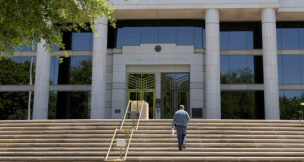AG withdraws opinion on use of public dollars on elections
Luige del Puerto and Ben Giles//May 14, 2015//
AG withdraws opinion on use of public dollars on elections
Luige del Puerto and Ben Giles//May 14, 2015//
Following a barrage of criticism, an opinion by Attorney General Mark Brnovich that allowed officials to use public resources on election topics has been withdrawn.
Critics said the opinion was far too expansive and licenses public officials to spread “government propaganda.”
The opinion was withdrawn this afternoon.
Brnovich’s decision wasn’t completely unexpected.
Earlier today, Ryan Anderson, spokesman for the Attorney General’s Office, said some have “misconstrued the intent of the recently issued opinion as a broadened interpretation of existing law.” Nonetheless, the AG was taking those criticisms seriously and was taking another look at the opinion, he said.
“We are internally reviewing this opinion to make sure that we protect the First Amendment rights of public officials while ensuring that we are protecting taxpayer dollars,” Anderson told the Arizona Capitol Times.
Critics of the opinion, authored at the request of Maricopa County Attorney Bill Montgomery and Yavapai County Attorney Sheila Polk, say government officials at all levels may view the opinion as a license to influence voters and change the outcome of elections.
“Conservatives in Arizona have for years pointed to certain institutions and actors that tend to be liberal using government dollars to influence elections and grow government,” said Kory Langhofer, an elections attorney. “This advisory opinion undermines those conservative arguments and makes it easier for government-funded propaganda to take place in Arizona.”
Additionally, officials with the Goldwater Institute say the opinion ignores current law and instead references an outdated court opinion. Current laws prohibit the use of public resources to influence elections.
The motives of Montgomery and Polk are clear – both prosecutors are outspoken opponents of marijuana legalization. They wanted guidance on what activities, in their official capacities as county attorneys, would be above board now that activists with the Campaign to Regulate Marijuana Like Alcohol have filed a ballot initiative to bring marijuana legalization to a vote in 2016.
Langhofer, who represents a group that briefly flirted with pushing a competing recreational marijuana initiative, said the opinion is too broad.
“They didn’t have to extend this interpretation to state agencies, community colleges, state universities, municipalities (and others),” Langhofer said.
The opinion cites a 2002 Court of Appeals decision on Kromko v. City of Tucson, which the Goldwater Institute’s Christina Sandefur said too broadly interpreted state prohibitions on public-official electioneering.
Sandefur, vice president for policy at the institute, said the court ruled that express advocacy only occurs when an entity “unambiguously urges a person to vote in a particular manner.”
“The result was that, despite statewide prohibitions on using public resources to ‘influence the outcome of elections,’ public entities nevertheless allocated taxpayer resources to electioneering,” Sandefur said.
Those abuses led to new laws, adopted by the Legislature in 2013, that impose significantly greater restrictions on the use of public resources to influence elections than the statutes that existed when the Court of Appeals decision was issued. New law makes it clear that “public resources may only be used in an ‘impartial or neutral’ manner to inform and educate the public on election issues as required by law, such as through neutral government-sponsored debates or forums, or election publicity pamphlets,” Sandefur said.
The attorney general opinion ignores those reforms, she said.
“Public officials would do well to consult the law itself and ensure that they respect the state’s strict prohibitions on electioneering on the taxpayer’s dime,” Sandefur said.
Although the opinion will be used by conservatives opposing marijuana legalization in the immediate future, it represents a nightmare scenario for conservatives in the broader sense, Langhofer said.
For instance, if lawmakers in the future succeed in putting a measure on the ballot to repeal or gut Clean Elections, the opinion could be used by the commission to justify spending money not just to promote itself in a general way – which it has done in the past and is legal – but also to disseminate literature or produce TV commercials that directly talk about the referral.
Langhofer said local governments are likely to welcome the opinion.
Municipalities, for example, regularly face referendum measures against orders or rules adopted by their councils.
If faced with a referendum against its sports stadium, Glendale’s City Council could, for example, spend a million dollars on a campaign telling people how great the sports stadium is – so long as the campaign’s message is ambiguous enough so that two reasonable voters could disagree whether it urges a vote for or against the referendum, Langhofer said.
If such spending were to take place, “that is inarguably government propaganda, and it definitely would have affected the outcome of the election and this gives them cover for that sort of activity,” Langhofer added.
When asked about the scenarios raised by Langhofer, Anderson earlier said he won’t speculate on hypothetical situations and maintained that the opinion’s intent is to ensure that public officials retain their ability to educate the public on ballot measures.
“That being said, this attorney general takes any allegations of an abuse of taxpayer dollars by a government entity very seriously, and this office has every intention to continue to investigate and fully prosecute public officials or governments (that) abuse the law by illegally using public resources to influence elections,” he said.



















